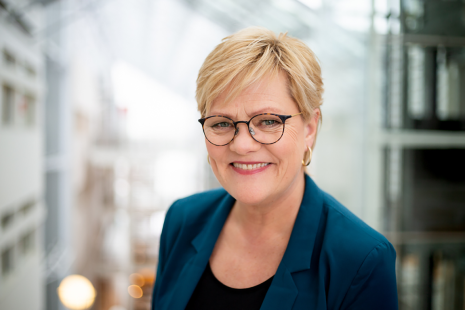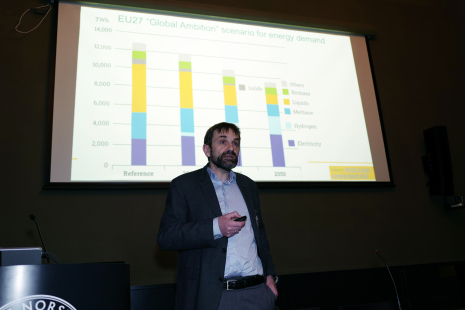
Long-term Perspectives on the Energy Transition: Enablers and Barriers
The VISTA Day serves as a yearly gathering, bringing together prominent figures from research, education, industry, and politics.
Its purpose is to address our society’s most critical challenge – the climate-energy issue – through engaging discussions and exchanges of ideas.
Turkish economist and energy expert and Executive director of the International Energy Agency, (IEA) since 2015.
Birol has taken steps to modernise IEA, including strengthening ties with emerging economies like India and China, and stepping up work on the clean energy transition and international efforts to reach net zero emissions.
Birol was on the Time 100 list of the world's most influential people in 2021, and has been named has been named by Forbes magazine as among the most influential people on the world's energy scene.
Birol is visiting The Norwegian Academy of Science and Letters at the Academy as part of the VISTA Day 2023.
Web article (in Norwegian) on the conclusions on the workshop series on the energy crisis in Europe.
The report Energikrisen i Europa og det norske kraftmarkedet summarizes the conclusions from the workshop series The Norwegian Academy of Science and Letters organized together with NTVA in 2022.
In 2022, The Norwegian Academy of Science and Letters helped organize six workshops under the umbrella title "Energy Crisis in Europe".
The background for the initiative was a longer period of very high energy prices in Europe, which caused high electricity prices in Norway and large price differences between regions.
VISTA is a researcher collaboration between Equinor and the Norwegian Academy of Science and Letters. VISTA was established as a strategic partnership in 1985 to strengthen the research collaboration between academia and industry.
The purpose of today’s activity is to stimulate basic research and research education within strategically important subject and competence areas related to the energy transition.
In 2020 two VISTA centers were established one at the University of Bergen and one at NTNU in Trondheim to host PhDs, researchers from academia and other relevant research partners.
Bergen:
Center for Modeling of Coupled Subsurface Dynamics (UiB)
Trondheim:
NTNU VISTA CAROS NTUN, Center for Autonomous Robot Operations Subsea
As the reliance on underground fossil energy wanes, the pivot towards harnessing energy directly from Earth’s surface is imperative. For the energy transition to be successful, several complex dilemmas need to be addressed and solved.
The meeting will be streamed live at 6 PM on the webpage.
The urgent energy transition unveils a series of complex challenges and vital questions:
Growth vs Energy Transition:
The Paris Agreement predicates that emissions reductions should occur locally, requiring every nation’s contribution to the global energy transition. But can this transition occur without hampering growth in developing and emerging economies? Emerging economies like China and India are unlikely to sacrifice increasing prosperity for global climate efforts. The transition must therefore occur without impeding growth in these regions, but how?
Land Sacrifice Dilemma:
Previously, energy was predominantly harvested from beneath the Earth (coal, gas, and oil). The shift towards surface-based energy sources (wind farms, solar parks, biomass, hydroelectric, and nuclear power plants) will lead to increased competition for the Earth’s surface areas. The implication and challenge are that access to renewable energy must be balanced alongside the land surface required to produce food, living and transportation space and areas for recreation, and with the overarching constraint of conservation of biological diversity.
Public Acceptance:
The shift towards surface-based energy sources (wind farms, solar parks, biomass, hydroelectric, and nuclear power plants) often faces significant local resistance, delaying crucial and urgent progress. How can we secure public acceptance and support for these necessary transitions and the associated land use?
This is vital as success in the energy transition depends on broad public support. If obtaining public acceptance proves challenging in countries like Norway, how can we expect a smoother process in other nations where land sacrifice is essential for the energy transition?
Program
For the energy transition to be successful, these dilemmas need to be addressed and solved.
We have invited the following speakers to discuss the dilemmas we are facing:
- Dr. Fatih Birol, Executive Director of the IEA
- Andreas Bjelland Eriksen (Labour Party / Ap) Minister of Climate and Environment
- Asgeir Tomasgard, Director NTNU Energy Transition Initiative
Each speaker will illuminate the topic with a 20-minute presentation, followed by an hour-long panel debate moderated by Kristin Halvorsen, Director of CICERO.
Participants in the debate:
- Dr. Fatih Birol, Executive Director of the IEA
- Asgeir Tomasgard, Director NTNU Energy Transition Initiative
- Tina Bru (The Conservative Party / H)
- Ida Dokk Smith, Senior Research Fellow in the Research group on climate and energy (NUPI).
- Representative from the Ministry of Climate and Environment (Labour Party / Ap)



